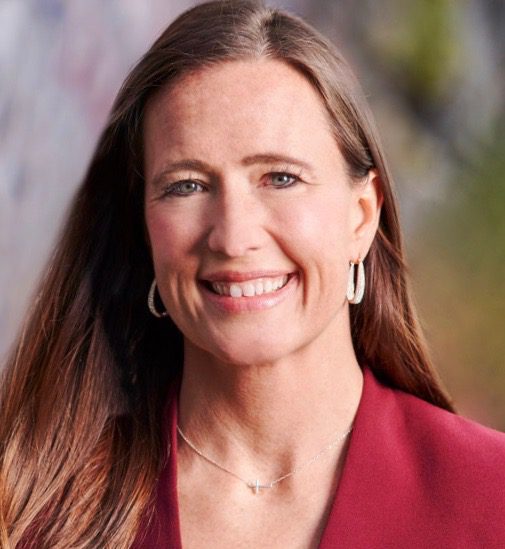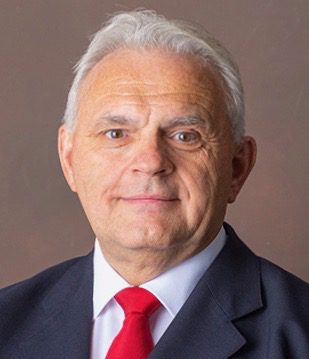Bruce Poliquin, the former congressman from Maine, said he was asked by state and national Republican leaders to try and reclaim his seat from first-term Democratic representative Jared Golden in what would have been a rematch of their 2018 race.
He declined.
Then Donald Trump called with a similar request. Poliquin again said no.
Instead the candidates in the July 14 primary for Maine’s 2nd District Republican nomination are Adrienne Bennett, who spent seven years as a press secretary for former Gov. Paul LePage; Eric Brakey, a former state senator; and Dale Crafts, a former state representative.
“There are 13 (districts) that President Trump won by double digits in 2016 that a Democrat currently sits in, and this is one of them,” said a National Republican Campaign Committee spokesman, Michael McAdams. “That automatically makes it one of the top races in the country.”
As his parents’ guardian and only surviving child, Poliquin said he couldn’t run for the seat this year because he needed to take care of them.
Now, in one of the most critical races for Republicans in New England, Maine’s GOP is heading into a competitive three-way primary on July 14 without a strong frontrunner.
Brakey has raised and spent the most money and has the most name recognition; he ran for the U.S. Senate in 2018 against Angus King, directed Ron Paul’s 2012 presidential primary campaign in Maine and served in the state legislature from 2014-18. Bennett was an insider in LePage’s administration but lost his endorsement to Crafts, an eight-year state representative who has the largest backing from Maine’s Republican establishment.
A recent We Ask America poll commissioned by Bennett’s campaign showed voters surveyed were almost evenly split between being undecided (29 percent) and supporting one of the three candidates. Twenty-eight percent favored Bennett, 22 percent supported Brakey and 20 percent chose Crafts.
But a SurveyUSA poll commissioned by the electoral reform group FairVote and announced Wednesday by the Bangor Daily News, has Crafts in the lead with 37 percent of those surveyed, followed by Bennett with 25 percent and Brakey with 19.

The Maine GOP says the split is reflective of the electoral system and the party — and donors — will rally behind the winning candidate.
“I don’t think there’s been a perception from national donors that there’s an obvious person to back,” said James Melcher, a political science professor at the University of Maine at Farmington. “There isn’t an obvious … candidate quality,” a metric political scientists use to rate people based on how much elected experience they have. “It’s a problematic measure, but I think the gap between the Republican candidates that way isn’t as clear.”
While Poliquin might have cleared the field, Melcher said, the fact that multiple candidates are competing indicates Republicans think it’s a race they can win.
The 2nd Congressional District race poses a stark contrast to Maine’s other high-profile overtake attempt — the Democratic effort to win Republican Sen. Susan Collins’ seat, where both party support and record sums of money have poured in to back Maine’s House Speaker Sara Gideon.
The higher rank of the senatorial office, Collins’ longevity in the seat — she’s served since 1997 — and frustrations with her record as a swing voter have made Maine’s senate race more prominent.
“I think a lot of people look at that as the race that might change or maintain control of the Senate, whereas it’s less likely that one House seat might do that,” Melcher said. “I think people feel like the stakes are so much higher.”
But more money will enter the 2nd Congressional District race soon, Melcher said.
“(This) race will be plenty expensive and full of national money once there is a Republican nominee for donors to unite behind.”
From recruitment to campaigning
When there is no Republican incumbent or clear front-runner in a federal race, the National Republican Congressional Committee typically takes the lead on recruiting candidates, said Jason Savage, executive director of the Maine Republican Party.
Once candidates enter the race and create a contested primary, neither the state GOP nor the NRCC endorses a candidate or picks a side, according to party officials.
“Our goal is always to give everybody the same resources, give everybody the same advice and be prepared on day one so that when (we’re) past the primary, we have a relationship with (the winning) candidate to get them off and going on their general election campaign,” Savage said.
McAdams wouldn’t say whether the NRCC recruited candidates for this race. However, Poliquin confirmed that he was contacted by the NRCC.
RELATED Follow the Money: Maine Federal Campaign Finance Tracker
Brakey, Bennett and Crafts align in their support for Trump, which analysts aren’t sure will help or hurt the GOP effort.
“I do think that the Republican candidates are banking on Trump being popular in the 2nd District,” said Amy Fried, chair of the political science department at the University of Maine. “We’ll just sort of have to see if that’s true and if it will matter. Maine voters in general are pretty comfortable with splitting their votes between parties, so even if Trump was popular, there could still be voters who would vote for Golden.”

The district’s congressional seat has historically flip-flopped between parties.
Golden narrowly ousted Poliquin, a two-term incumbent, in a result decided by ranked-choice voting in 2018. Poliquin gathered 2,632 more votes than Golden on election night, but because he fell short of a majority, ranked-choice voting kicked in and Golden emerged with 2,905 more votes and a 50.53 percent majority.
Savage and other Republicans, including the three primary candidates, contend that Golden has gone against the wishes of the district’s voters. High on that list is his split vote to impeach Trump, who won the district by a 10-point margin in 2016, and how often he has voted against the president’s positions: 87.5 percent of the time, according to the tracking website FiveThirtyEight.com.
But incumbency is on his side, said Jon Reisman, the 1998 GOP nominee for the seat, and associate professor of economics and public policy at the University of Maine at Machias.
“If Golden’s going to be defeated, it’s got to be this time and his first (race) as an incumbent,” he said. “Once he’s in, after that he’s going to be very difficult to dislodge.”
Savage said each of the three primary candidates has a unique story and perspective, and brings something different to the ticket. He thinks any of them could defeat Golden in November.
Adrienne Bennett
Bennett, a Bangor resident, positions herself as a fiscal conservative who is “pro-life, pro-Second Amendment (and) anti-China,” and a Trump supporter.
“This is an election of a lifetime,” she said, calling it a contest of socialism versus capitalism, with constitutional rights and religious liberties at stake. “We have some really big issues we have to deal with.” Those issues, she said, include including immigration, manufacturing, infrastructure, gun rights, a ballooning deficit, caring for seniors and moving past the pandemic.

Bennett said her impoverished upbringing in rural Troy and subsequent rise helped her “understand the people of the 2nd District because I am one of them through and through.”
“I’ve had to go through my share of struggles and live paycheck to paycheck, and build my own business, and really go through failure to get to success,” she said. “(District 2 voters) want a candidate who they can relate to, who they know is not going to back down. They want a fighter and they want somebody who says what they mean and who means what they say, and they’re going to go do it and get the job done.”
Before serving as LePage’s press secretary starting in 2010, Bennett spent almost a decade at WABI-TV in Bangor. Since LePage left office, she has worked in banking and real estate, and for the state Department of Labor.
Unlike her primary opponents, Bennett has not held public office. She said she expected to “easily get past” that, pointing to the district’s support in 2016 for Trump, who hadn’t held office.
Bennett also said her experience in media, communications and government “sets me up for success in Washington.”
While she touts close ties to the LePage administration, the former governor passed her over to endorse Crafts.
The Maine Republican party is “still very much the party of LePage,” said Fried, which could give Crafts an edge. But Reisman said Bennett’s involvement with the administration and visibility from her TV career could be enough to counter losing LePage’s support.
“Remember, the district voted for Trump in 2016,” Reisman said. “He had held no elective office; he was a reality TV star. In a sense, (Bennett’s) being Gov. LePage’s press secretary for seven years is pretty close to being a reality TV star.”
Most undecided voters “are going to break for Adrienne for a couple of reasons,” Reisman predicted.
First, he said the same dynamic is at play that caused Brian Kemp, the Republican governor of Georgia, to appoint 49-year-old Kelly Loeffler to succeed a senator who resigned mid-term due to health reasons: “a younger woman is what the GOP needs,” Reisman said. Bennett is 41.
Second, “geographically, (Bennett’s) got better name recognition than either of the other two,” Reisman said, predicting that Brakey and Crafts will split their home county of Androscoggin, and Bennett will prevail elsewhere because voters know her from her WABI days.
Dale Crafts
Crafts, of Lisbon, is a businessman and former Lisbon Town Council member who served four terms in the Maine House from 2008-16. He entered the race after being encouraged by State Sen. Jeff Timberlake (R-Androscoggin) and, two days later, LePage.
“You’re the guy who can beat Jared Golden,” Crafts said LePage told him. “He’s got nothing against (Adrienne Bennett). He just thinks I’m a better candidate with my experience.”
Crafts, 61, has since been endorsed by more than 50 former and current legislators, sportsmen and veterans.

LePage could not be reached for comment.
Timberlake, a first-term senator, served eight years in the Maine House, including six with Crafts.
“I never gained more respect for anybody in the time I was there than I did Dale,” he said. “He meets all the values that your parents ever taught you when you were growing up.”
Timberlake recalled encouraging Crafts to run last fall after Brakey’s campaign announcement and before Bennett’s.
“I said, ‘Dale, you’re the man for the job. Eric’s a good guy — Eric’s served for a number of years, too — but he’s a young kid, he’s never had a job, and never really worked, and doesn’t know what it takes to make a deal and get things done. And this country is looking for somebody with leadership and faith, and I think you’re that person.’”
Timberlake noted how Crafts “just goes on and lives his life like you and I would” despite using a wheelchair since being paralyzed in a motorcycle crash in 1983.
“I watched him crawl out from underneath his camper he was rebuilding and his pickup truck, watched him get off and on, and build a sling to get him on his Kubota four-wheel drive tractor,” he said. “And he just goes and works all the time. Anybody with that much determination and the work ethic, you just know is going to do the right thing.”
Running, Crafts said, was not something he expected to do. But with Timberlake and LePage’s encouragement, and after praying and getting his family’s blessing, Crafts entered the race.
“I have children and grandchildren (that) I want to have a good future — that’s why I’m doing it,” he said. “I tell people I don’t want to be a politician, I want to be a servant.”
Asked what issues concerned voters the most, Crafts said the economy and healthcare. He said Mainers need more job opportunities — he noted examples in agriculture and the coast’s deep-water ports — to staunch the flow of residents moving away for work. He cited a need to cut the “skyrocketing costs” that can have a “devastating” effect on families.
“I’m a free-market capitalist,” he said. “When I was a legislator we fought hard to purchase healthcare across state lines (but) couldn’t get it done. I’m really hoping that I can be a part of (a solution).”
Eric Brakey
Brakey is an Ohio native who touts his family’s deep Maine roots on his campaign website and is the youngest candidate in the race at age 31. He moved to Maine in 2012 to be the state director for Ron Paul’s presidential campaign. From 2014-18, Brakey represented District 20, which includes the Auburn and New Gloucester areas, for two terms in the state senate. He has also managed financial records for Brakey Energy, a family-run business based in Ohio, according to his website.
While a state senator, Brakey is perhaps best known for introducing and helping pass constitutional carry legislation in 2015.

Brakey declined to be interviewed by phone. Through his spokesperson, David Boyer, Brakey responded in writing to the Maine Monitor.
“I’ve watched Washington D.C. steal our paychecks and trample our constitutional freedoms for too long,” he wrote. “I decided to run for Congress to free Maine and free America from this corrupt system.”
The two most common concerns he hears from voters while campaigning are jobs and healthcare.
“That’s why I have plans to create jobs and fix healthcare by firing the Washington bureaucrats strangling our economy and driving up the price of healthcare,” he wrote.
Maine Rep. Billy Bob Faulkingham (R-Winter Harbor), who endorses Brakey, applauded Brakey’s work on constitutional carry and said The American Conservative Union rated him among the most conservative Maine state senators for all four of his years in office.
What he likes most about Brakey compared to the other candidates is he “has a set of core values and that’s where his allegiance lies,” Faulkingham said.
“He’s not looking for what direction the wind is blowing,” Faulkingham said. “With Eric, if he agrees with you, he’s going to agree with you. And if he disagrees with you, he’s going to disagree with you and explain why he disagrees with that.
“I’ve decided to stick with Eric because I think (he) has the fortitude that he will decide on the issues on his own and for his district. He’ll have this district’s best interest when he represents us in Washington.”
Comparing himself to his opponents, Brakey described himself as the only candidate who has won a competitive race.
“Maine people know me as a proven champion who gets things done,” Brakey wrote. “I will work with anyone, Republicans and Democrats, to protect the freedoms and paychecks of Maine people.”
Reisman said Brakey’s loss in the 2018 Senate campaign against King didn’t do him “any favors with most Republicans.” He raised little money, had no opposition and “didn’t take much of a fight to Angus.”

Other analysts point to Brakey’s campaign stunts as a concern. In October, Brakey announced he was raffling off an AR-15 to a donor to celebrate the fourth anniversary of Maine’s constitutional carry legislation. In June, he tweeted a video of himself firing off a flame gun, captioned “@RepGolden, you’re fired.”
Al Diamon, a political columnist for the Portland Phoenix and Daily Bulldog, and a 2nd District resident, said while Brakey is “enthusiastic and hard-working,” he “keeps slipping into looneyville.
“Raffling off an assault weapon? His obsession with socialists and gun-grabbers? Even among libertarians he’s considered extreme,” Diamon said.
Reisman said he’s surprised none of the candidates have addressed ranked-choice voting, which will be used in the primary. He believes those who select Brakey or Crafts first would sooner rank Bennett second because the two men represent opposing libertarian and evangelical wings of the party.
Winning the primary is the first hurdle. The winner won’t have two of Golden’s advantages: his incumbency and his veteran status — the latter, Reisman said, is quite important in the 2nd Congressional District. An additional hurdle: the five-week coronavirus-caused delay in the primary translates into a significant delay in campaigning for the general election.
Diamon said his “strong sense is that Golden has the edge,” despite his “erratic-as-hell” voting record, having “made a ton of freshman mistakes,” and whose split impeachment vote was “a dumb thing.”
“A lot depends on Golden’s campaign,” Diamon said. ”He’ll have money … (and) he ran a pretty good campaign last time. We’ll see.”







